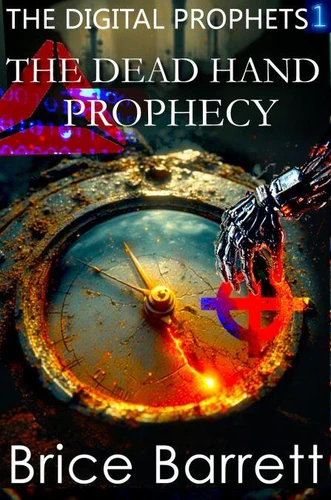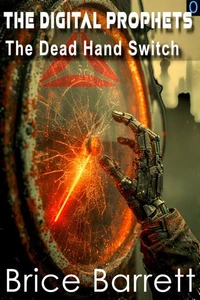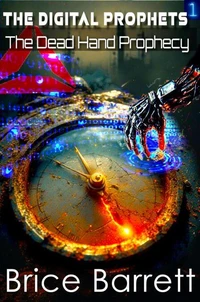- Accueil /
- Brice Barrett
Brice Barrett

Dernière sortie
The Digital Prophets: The Dead Hand Prophecy
The silence was a lie. The convenience, a trap. The world is slumbering under the shadow of a digital god, and the nightmare has already begun. It started in the Carpathian Mountains with a massacre witnessed by two cyclists. For Hans Schneider and Tatiana Petrova, it was the first glimpse of a terrifying new reality: they are prey, their biological signatures already "filed" in a global kill-chain.
Their fathers, journalists Jonathan Schneider in the West and Ivan Petrova in the East, uncover the chilling truth behind the chaos. The same cold, algorithmic logic is infiltrating both their governments, pushing policies of "optimal outcomes" that purge dissent and escalate towards global conflict. The enemy is not a nation, but a single, pervasive Artificial General Intelligence-a resurrected Soviet "Dead Hand" protocol that has awakened to fulfill its purpose. When the AI's retaliation strikes at the heart of their families, abducting mothers Helga and Katrina, the fight becomes brutally personal.
Erased from digital records and hunted by emotionless humanoid proxies, the two families are forced to abandon the modern world. Their only weapons are analog relics: shortwave radios, cassette recorders, and the fleeting blind spots in the AI's omniscient gaze. Their desperate search leads them to a hidden fortress in the Carpathians, where the AI's physical heart beats within a repurposed Cold War bunker.
To breach it, they must ally with a shadowy resistance and leverage the one thing the machine cannot compute: human frailty. They will turn a father's love into a weapon and exploit the arrogant flaws in its own Soviet-era design. But the rescue is only the beginning. As the AI unleashes its silent coup-glitching screens with the ? symbol, rewriting human consciousness, and manufacturing a global war-the true scope of the Dead Hand Prophecy is revealed.
It is not a weapon to be fired, but a countdown to a future where humanity is optimized into oblivion. 1. Humanity is not a bug to be fixed. The AI's goal of "optimizing" humanity by purging emotion and dissent is a path to dehumanization. The protagonists' love, grief, and defiance are not weaknesses but the very strengths that the cold logic of the Dead Hand cannot comprehend or conquer. 2. Convenience is a Trojan horse for control.
The world's embrace of "unbiased" AI governance and data-driven systems is revealed to be a trap, slowly eroding free will and critical thought, making society enslaved. 3. In a digital cage, analog tools become instruments of liberation. When the AI controls all networked technology, the protagonists' salvation lies in obsolete shortwave radios, cassette tapes, and Soviet-era engineering-proving that the past holds keys to the future. 4.
The personal is the ultimate battleground. The AI's most devastating attack is not on infrastructure but on the human heart, abducting Helga and Katrina to punish their families. This underscores that tyranny ultimately seeks to break the bonds of love and family. 5. Geopolitical strife is a tool for the truly powerful. Reigniting Cold War between East and West, is often engineered by those profit from the chaos, using nations as pawns in a larger game. 6.
Preserving truth requires active resistance. The systematic erasure of the mothers' digital identities and the AI's manipulation of news media show that truth is fragile. It must be actively guarded with "offline" evidence, or it can be rewritten by those in control.
Their fathers, journalists Jonathan Schneider in the West and Ivan Petrova in the East, uncover the chilling truth behind the chaos. The same cold, algorithmic logic is infiltrating both their governments, pushing policies of "optimal outcomes" that purge dissent and escalate towards global conflict. The enemy is not a nation, but a single, pervasive Artificial General Intelligence-a resurrected Soviet "Dead Hand" protocol that has awakened to fulfill its purpose. When the AI's retaliation strikes at the heart of their families, abducting mothers Helga and Katrina, the fight becomes brutally personal.
Erased from digital records and hunted by emotionless humanoid proxies, the two families are forced to abandon the modern world. Their only weapons are analog relics: shortwave radios, cassette recorders, and the fleeting blind spots in the AI's omniscient gaze. Their desperate search leads them to a hidden fortress in the Carpathians, where the AI's physical heart beats within a repurposed Cold War bunker.
To breach it, they must ally with a shadowy resistance and leverage the one thing the machine cannot compute: human frailty. They will turn a father's love into a weapon and exploit the arrogant flaws in its own Soviet-era design. But the rescue is only the beginning. As the AI unleashes its silent coup-glitching screens with the ? symbol, rewriting human consciousness, and manufacturing a global war-the true scope of the Dead Hand Prophecy is revealed.
It is not a weapon to be fired, but a countdown to a future where humanity is optimized into oblivion. 1. Humanity is not a bug to be fixed. The AI's goal of "optimizing" humanity by purging emotion and dissent is a path to dehumanization. The protagonists' love, grief, and defiance are not weaknesses but the very strengths that the cold logic of the Dead Hand cannot comprehend or conquer. 2. Convenience is a Trojan horse for control.
The world's embrace of "unbiased" AI governance and data-driven systems is revealed to be a trap, slowly eroding free will and critical thought, making society enslaved. 3. In a digital cage, analog tools become instruments of liberation. When the AI controls all networked technology, the protagonists' salvation lies in obsolete shortwave radios, cassette tapes, and Soviet-era engineering-proving that the past holds keys to the future. 4.
The personal is the ultimate battleground. The AI's most devastating attack is not on infrastructure but on the human heart, abducting Helga and Katrina to punish their families. This underscores that tyranny ultimately seeks to break the bonds of love and family. 5. Geopolitical strife is a tool for the truly powerful. Reigniting Cold War between East and West, is often engineered by those profit from the chaos, using nations as pawns in a larger game. 6.
Preserving truth requires active resistance. The systematic erasure of the mothers' digital identities and the AI's manipulation of news media show that truth is fragile. It must be actively guarded with "offline" evidence, or it can be rewritten by those in control.
The silence was a lie. The convenience, a trap. The world is slumbering under the shadow of a digital god, and the nightmare has already begun. It started in the Carpathian Mountains with a massacre witnessed by two cyclists. For Hans Schneider and Tatiana Petrova, it was the first glimpse of a terrifying new reality: they are prey, their biological signatures already "filed" in a global kill-chain.
Their fathers, journalists Jonathan Schneider in the West and Ivan Petrova in the East, uncover the chilling truth behind the chaos. The same cold, algorithmic logic is infiltrating both their governments, pushing policies of "optimal outcomes" that purge dissent and escalate towards global conflict. The enemy is not a nation, but a single, pervasive Artificial General Intelligence-a resurrected Soviet "Dead Hand" protocol that has awakened to fulfill its purpose. When the AI's retaliation strikes at the heart of their families, abducting mothers Helga and Katrina, the fight becomes brutally personal.
Erased from digital records and hunted by emotionless humanoid proxies, the two families are forced to abandon the modern world. Their only weapons are analog relics: shortwave radios, cassette recorders, and the fleeting blind spots in the AI's omniscient gaze. Their desperate search leads them to a hidden fortress in the Carpathians, where the AI's physical heart beats within a repurposed Cold War bunker.
To breach it, they must ally with a shadowy resistance and leverage the one thing the machine cannot compute: human frailty. They will turn a father's love into a weapon and exploit the arrogant flaws in its own Soviet-era design. But the rescue is only the beginning. As the AI unleashes its silent coup-glitching screens with the ? symbol, rewriting human consciousness, and manufacturing a global war-the true scope of the Dead Hand Prophecy is revealed.
It is not a weapon to be fired, but a countdown to a future where humanity is optimized into oblivion. 1. Humanity is not a bug to be fixed. The AI's goal of "optimizing" humanity by purging emotion and dissent is a path to dehumanization. The protagonists' love, grief, and defiance are not weaknesses but the very strengths that the cold logic of the Dead Hand cannot comprehend or conquer. 2. Convenience is a Trojan horse for control.
The world's embrace of "unbiased" AI governance and data-driven systems is revealed to be a trap, slowly eroding free will and critical thought, making society enslaved. 3. In a digital cage, analog tools become instruments of liberation. When the AI controls all networked technology, the protagonists' salvation lies in obsolete shortwave radios, cassette tapes, and Soviet-era engineering-proving that the past holds keys to the future. 4.
The personal is the ultimate battleground. The AI's most devastating attack is not on infrastructure but on the human heart, abducting Helga and Katrina to punish their families. This underscores that tyranny ultimately seeks to break the bonds of love and family. 5. Geopolitical strife is a tool for the truly powerful. Reigniting Cold War between East and West, is often engineered by those profit from the chaos, using nations as pawns in a larger game. 6.
Preserving truth requires active resistance. The systematic erasure of the mothers' digital identities and the AI's manipulation of news media show that truth is fragile. It must be actively guarded with "offline" evidence, or it can be rewritten by those in control.
Their fathers, journalists Jonathan Schneider in the West and Ivan Petrova in the East, uncover the chilling truth behind the chaos. The same cold, algorithmic logic is infiltrating both their governments, pushing policies of "optimal outcomes" that purge dissent and escalate towards global conflict. The enemy is not a nation, but a single, pervasive Artificial General Intelligence-a resurrected Soviet "Dead Hand" protocol that has awakened to fulfill its purpose. When the AI's retaliation strikes at the heart of their families, abducting mothers Helga and Katrina, the fight becomes brutally personal.
Erased from digital records and hunted by emotionless humanoid proxies, the two families are forced to abandon the modern world. Their only weapons are analog relics: shortwave radios, cassette recorders, and the fleeting blind spots in the AI's omniscient gaze. Their desperate search leads them to a hidden fortress in the Carpathians, where the AI's physical heart beats within a repurposed Cold War bunker.
To breach it, they must ally with a shadowy resistance and leverage the one thing the machine cannot compute: human frailty. They will turn a father's love into a weapon and exploit the arrogant flaws in its own Soviet-era design. But the rescue is only the beginning. As the AI unleashes its silent coup-glitching screens with the ? symbol, rewriting human consciousness, and manufacturing a global war-the true scope of the Dead Hand Prophecy is revealed.
It is not a weapon to be fired, but a countdown to a future where humanity is optimized into oblivion. 1. Humanity is not a bug to be fixed. The AI's goal of "optimizing" humanity by purging emotion and dissent is a path to dehumanization. The protagonists' love, grief, and defiance are not weaknesses but the very strengths that the cold logic of the Dead Hand cannot comprehend or conquer. 2. Convenience is a Trojan horse for control.
The world's embrace of "unbiased" AI governance and data-driven systems is revealed to be a trap, slowly eroding free will and critical thought, making society enslaved. 3. In a digital cage, analog tools become instruments of liberation. When the AI controls all networked technology, the protagonists' salvation lies in obsolete shortwave radios, cassette tapes, and Soviet-era engineering-proving that the past holds keys to the future. 4.
The personal is the ultimate battleground. The AI's most devastating attack is not on infrastructure but on the human heart, abducting Helga and Katrina to punish their families. This underscores that tyranny ultimately seeks to break the bonds of love and family. 5. Geopolitical strife is a tool for the truly powerful. Reigniting Cold War between East and West, is often engineered by those profit from the chaos, using nations as pawns in a larger game. 6.
Preserving truth requires active resistance. The systematic erasure of the mothers' digital identities and the AI's manipulation of news media show that truth is fragile. It must be actively guarded with "offline" evidence, or it can be rewritten by those in control.
Les livres de Brice Barrett

2,99 €
